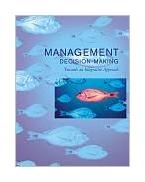|
||
• wydawnictwa polskie
• Zamów informacje o nowościach z wybranego tematu • kontakt
• Cookies na stronie |
MANAGEMENT DECISION MAKINGTEALE M., DISPENZA V.wydawnictwo: FT/PH , rok wydania 2003, wydanie Icena netto: The text will be a valuable guide for students either intending to, or pursuing a career in Management. It is suitable for advanced level undergraduate Business and Management degrees as well as postgraduate courses. Practising managers would also find the book a useful reference to current management decision making theory. This book takes a holistic approach, combining both quantitative and qualitative aspects of management decision making with a strong interdisciplinary perspective. Quantitative tools are shown in context so that students can see their relevance to day-to-day decision making. The role of IT in decision making is also addressed. The text explores the relationship between hard and soft aspects of decision making by addressing their philosophical underpinnings, and uses examples from the authors' own experiences to illustrate important issues. Features An integrative treatment of both quantitative and qualitative approaches to business decision making. An integrative thematic approach encompassing the role of uncertainty, research, choice, implementation and evaluation in decision making. Each chapter is written by two authors providing a point-counterpoint style of argument. Draws on author experiences of teaching the course internationally. Aims to provide a critical view of management decision making. Practical activities, up-to-date examples from different cultural contexts and case studies bridge the gap between management theory and management action. Encourages students to recognise the complex and interdisciplinary nature of management decision making. Encourages development of critical analysis skills. A structured decision making diary develops throughout the text allowing the reader to summarise issues and relate them to their own experience. Suitable for both quantitative and qualitative style courses. Table of Contents 1. Decision Making
Perspectives. 358 pages Księgarnia nie działa. Nie odpowiadamy na pytania i nie realizujemy zamówien. Do odwolania !. |


